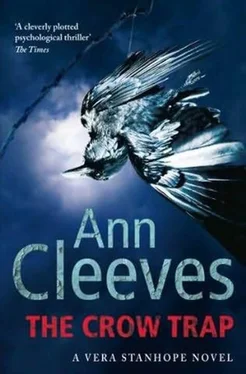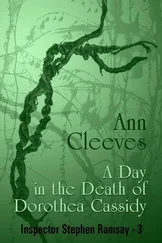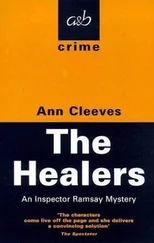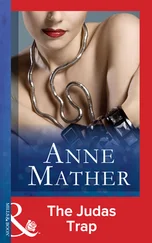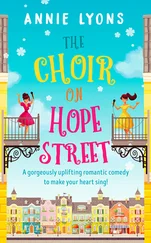He wasn’t there the next day. She came out of school looking for him.
She was certain by now that the man was her father and not just a figment of her imagination. The night before she’d taken out the scrapbook and studied the photograph. The likeness was so good that she was surprised she didn’t recognize -him immediately. She let the first bus go without her, hoping that he might turn up but he didn’t show.
Exactly a week after the first appearance, again after double Biology, he was there again. By now she had given him up. She had planned strategies for dealing with an appearance, but that was last week, and now she wasn’t sure what to do.
She stood for a moment. The bag on her shoulder was very heavy and she stood at a list, her head tilted, so she saw him at an odd angle. Today he had no newspaper and seemed more restless, more determined. He paced up and down the pavement, occasionally approaching groups of children. Grace, who was more streetwise than many children her age, thought he’d have to watch it or he’d get himself arrested.
She waited for the lollipop lady to stop the traffic then she crossed the road. He didn’t notice her because his eyes were fixed on another fair-haired girl of about her age. Grace knew her slightly. Her name was Melanie and she was very pretty.
“Excuse me.”
He turned sharply.
“I think you might be waiting for me. I’m Grace.”
He looked down at her. She stared back and waited coolly for his reaction. She wouldn’t be surprised if he was disappointed, if he was hoping for someone like Melanie. He stepped back a little. He was wearing spectacles and seemed to be finding it hard to focus on her. He smiled.
“Yes,” he said. His voice was so loud and clear that people nearby turned around to look. “Yes, of course. I can see you are.”
“Can you?”
“Oh yes. You look so like your mother.”
It was a long time since anyone had mentioned her mother. Psychologists and doctors in the assessment centre had asked about her occasionally, but they spoke tentatively, carefully. This was normal, almost joyous.
“Do I?” “Of course you do. Hasn’t anyone told you before?” “No,” she said.
“Well, you don’t look much like me, do you?”
That was certainly true. He was dark with a long, narrow face the shape of a horse’s. His eyebrows, which were starting to turn grey, met over the top of his nose. Grace had been told that was a sign of madness. She hadn’t believed it at the time but now she started to wonder. Not that it mattered.
“Well then,” he cried. “What should we do? Will anyone miss you if you don’t go straight back?”
She shook her head. Frank and Maureen had enough to worry about getting the boys under police curfew back in time. There weren’t any other rules.
“We have supper at about seven,” she said. “I should be home by then.”
That wasn’t quite true. Supper was a flexible meal usually eaten on trays in front of the television. Anyone not around was served later from the microwave. What she meant was that Charlie usually ate at seven and if she wasn’t there nobody thought to feed him.
“So we’ve got hours.” He tucked her hand in his arm and marched her down the wide noisy street towards the centre of town.
He seemed to know exactly where he was headed for and she thought perhaps he was taking her to his home. In the square the market was starting to pack up for the day. She came here often on Saturdays to buy cheap veg for Maureen and the stall holder called out to her, “You all right, pet?”
Perhaps she thought it odd for her to be walking along, arm in arm, with a middle-aged man.
“Fine,” she said. She would have liked to tell her that this was her father, but by then they had moved on, across the road, down the alley by Boots and towards the harbour where the big ships carrying timber from Scandinavia docked. He stopped outside a row of houses and at first she thought this was where he lived, then she realized it was a restaurant. The door had a sign saying closed but when her father pushed it, it opened. He seemed to know the owner, who was lazily polishing glasses, because although the restaurant was obviously shut he was waved good-humouredly to a table by the bar.
He said, “Any chance of coffee?” And when the barman nodded he added, “And ice cream? You’d like some ice cream, wouldn’t you, Grace?”
She answered that she would, though really she would have preferred coffee too.
The coffee came in a very small cup made of thick white china. There were three scoops of ice cream -strawberry, chocolate and vanilla in a white china dish.
“Now,” he said, ‘ don’t you tell me what you’ve been up to?” He replaced the cup in its saucer and it rattled slightly. She realized then that he was nervous. He had probably been building himself up to this meeting too. The jolly good humour outside the school was an act, like Charlie bouncing playfully around a stranger he wasn’t sure of.
So she took his question seriously and talked to him as she would to the social worker on one of her monthly visits, about school and how well she did in the maths test, and how difficult she found French and about the trip to the Hancock Museum in Newcastle. At first he listened intently but after a while his attention wandered. In the end he interrupted, “I expect you’re wondering why I haven’t looked you up before.”
“Nan wouldn’t tell me where you were.”
“You mustn’t blame her.”
“Is she still there?”
“Oh, she’s still in the caravan. They’re trying to persuade her to move into a home before the winter. She’s an embarrassment. She’ll go in the end but she likes to make them sweat.”
“Them?”
“Social workers, housing officials, people who know best. My bloody family, as if it had anything to do with them.” “But I thought she was your family.”
“What do you mean?” “I thought she was your mother.”
He threw back his head and gave a loud laugh like a vixen barking.
“Nan? No, of course not.” Then realizing that Grace was blushing at her mistake he added gently, “Next best thing though. She looked after me when I was little.” He looked at her across the tablecloth. “Don’t you know anything? Didn’t they tell you?”
“They gave me a photograph. You standing outside a house. Lots of rubbish.”
“I remember that one!” He seemed delighted. “That was the summer they let me stay on the estate. Before your mother rescued me.”
“From what?” She took the statement literally and was imagining robbers, pirates, hostage takers.
“From myself, of course.” He rubbed his hands and laughed. “From myself.”
“It didn’t look much like an estate. The photograph.”
She was thinking of the estate where she was living with Frank and Maureen, the neat cul-de-sacs of Barrett homes which housed other foster parents. This time he seemed to understand.
“Estate’s another name for the land attached to a big house,” he said.
“In this case Holme Park, Langholme.” He looked at her. “Have you heard of it?”
She shook her head.
“You’ve not met Robert then. Or Mother.”
“I’ve only ever met Nan.”
“So that’s how they played it.” He seemed shocked, but at the same time almost pleased. Grace thought it was like when someone you can’t stand lives up to your worst expectations, so you can say, “See, that’s what they’re like. I told you all along.”
“Who’s Robert?” “My brother.” He paused. “My elder brother.”
“Where do you live?”
For the first time he was evasive. “Nowhere special,” he said.
“Nowhere like Holme Park. And nowhere I could take a child.”
Читать дальше
